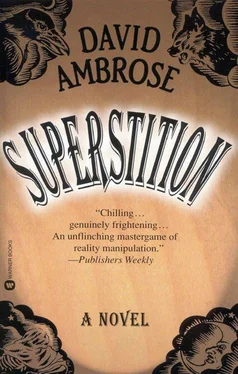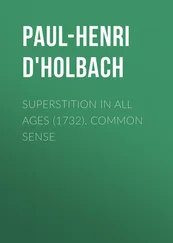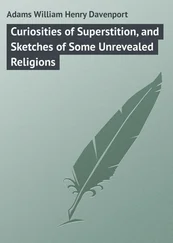David Ambrose - Superstition
Здесь есть возможность читать онлайн «David Ambrose - Superstition» весь текст электронной книги совершенно бесплатно (целиком полную версию без сокращений). В некоторых случаях можно слушать аудио, скачать через торрент в формате fb2 и присутствует краткое содержание. Жанр: Ужасы и Мистика, на английском языке. Описание произведения, (предисловие) а так же отзывы посетителей доступны на портале библиотеки ЛибКат.
- Название:Superstition
- Автор:
- Жанр:
- Год:неизвестен
- ISBN:нет данных
- Рейтинг книги:5 / 5. Голосов: 1
-
Избранное:Добавить в избранное
- Отзывы:
-
Ваша оценка:
- 100
- 1
- 2
- 3
- 4
- 5
Superstition: краткое содержание, описание и аннотация
Предлагаем к чтению аннотацию, описание, краткое содержание или предисловие (зависит от того, что написал сам автор книги «Superstition»). Если вы не нашли необходимую информацию о книге — напишите в комментариях, мы постараемся отыскать её.
Superstition — читать онлайн бесплатно полную книгу (весь текст) целиком
Ниже представлен текст книги, разбитый по страницам. Система сохранения места последней прочитанной страницы, позволяет с удобством читать онлайн бесплатно книгу «Superstition», без необходимости каждый раз заново искать на чём Вы остановились. Поставьте закладку, и сможете в любой момент перейти на страницу, на которой закончили чтение.
Интервал:
Закладка:
She looked at him for a while before speaking, taking time to absorb the idea.
“All right,” she said eventually, “tell me how we create a ghost.”
“First of all we have to define what we mean by ghost. What does the word ‘ghost’ convey to you?”
“Well, I suppose something from beyond the grave that drifts around moaning and goes bump in the night.”
“Returning to avenge murder, bring a warning, or just because it can't stop hanging around its favorite spots?”
“Something like that.”
His hand flicked dismissively. “I don't believe in that kind of ghost.”
“I never suspected that you did. What kind do you believe in?”
“Have you ever heard of tulpas…?”
“No.”
“It's a Tibetan word-means a ‘thought-form.’ You imagine something in the right way, and it becomes real.”
She felt her skeptic's eyebrow twitch again. “Now this I would have to see to believe.”
“That's the whole idea-you will see it.”
“Go on.”
“Think of any haunting you ever hear about. It's always the same story. Things start with unexplained noises, footsteps, doors opening and closing, cold spots, even odd smells-a general sense of some kind of ‘presence.’ You may get an outbreak of poltergeist phenomena, and sooner or later people start seeing things-a vague form, some kind of drifting cloud, or even somebody as real looking as themselves crossing a room or peering in a window. All the usual spooky stuff.”
“None of which,” Joanna interrupted with a note of caution, “has ever happened to me personally.”
He shrugged. “Nor me. But the evidence that it does happen is overwhelming. By far the hardest thing to swallow is the kind of explanation usually offered. Ghosts, when you think about it, are a pretty corny idea. If you dig back far enough into the history of any house, you'll find that something unpleasant once happened to somebody in it. Even if it's a new house, you'll probably find there used to be another house on the same site. You'll always find an explanation for a haunting if you look hard enough-the same way you'll see faces in a fire or passing clouds if you watch long enough.”
“So what are you saying?”
“I'm saying why are ghosts so repetitive and unoriginal? They're always doing the same thing and dressed the same way, no matter how often they're seen and how many people see them. They're more like a snapshot or a memory than an actual event. And a memory is something that's stored in the brain. And that's where I think ghosts come from: from the brains of the people who see them.”
“Hallucinations?”
“Of a kind.”
“How many kinds are there?”
“Well, there's the kind that only one person sees, and there's the kind that a bunch of people see together telepathically.”
“Assuming that telepathy is a fact.”
He accepted her point with a wry glance. “There are medical reasons to suspect that it is.”
“Such as?”
“There's a standard clinical procedure for measuring the brain's physical response to some stimulus such as a light shone in the eye or a tuning fork held to the ear. It's a matter of recorded fact that a thought projected at another person is capable of producing that same physical response.”
She looked at him awhile, her face unable to hide the misgivings she felt. “I guess I have to take it on trust that you're not bullshitting me. After all, I can always check.”
He laughed. “Go ahead, check. Telepathy's more commonplace than most people realize, but I'm not going to get into a fight over it, because you'll believe what you want to believe. We all do. All I'm saying is that telepathy is the most likely reason why ghosts are sometimes seen, heard, or sensed by several people at once. And the experiment I'm suggesting will provide evidence of that.”
“You say this experiment has already been done?”
“More than once. And it's time someone created another ghost and looked into the implications a little further.”
They did so for the rest of lunch, by which time Joanna knew that she had what she was looking for. It took less than twenty minutes to type up her notes for Taylor Freestone and take them into his office that afternoon. He held the few pages limply in his hand as though the effort tired him, then dropped them as he finished reading.
“Go for it,” he said languidly.
Joanna walked out with a sense of triumph. “Go for it” was as close as Taylor Freestone ever came to foaming at the mouth with enthusiasm.
7
Looking back, she saw that her elation at Taylor Freestone's reaction was more than just professional. She now had an opportunity to go on seeing Sam without the formalities of dating and all that that involved. She was surprised when she realized how much she wanted to go on seeing him. Thinking about it, she had to admit that he was certainly one of the more interesting men she'd met, and he wore well the longer she spent with him. She came to see very quickly that he wasn't just an act, a piece of cleverly polished performance art, sustainable for an evening or two, until the routine became stale and repetition set in. What made Sam interesting was his interest in everything. When he spoke it was a process of discovery-as much for him as for his listener. He never taught or lectured. Even when speaking of things with which he was familiar, he would put them together in new ways and find patterns that he hadn't noticed before. He was, on the whole, exhilarating company. And he made her laugh often.
There's a weakness somewhere, she found herself thinking one day when she got home. There always is, there has to be. In the end it'll show, something obvious that I should have seen all along.
Then she stopped herself, ashamed of the distrustful nature that such a thought revealed. That wasn't, she knew, the way she really was.
Nearing thirty, Joanna had behind her a love life that she liked to call “mature”-which she defined as having more good memories than bad, her only regrets being not things she'd done but some of the things she hadn't. She wasn't yet consciously thinking of any kind of permanent relationship. She'd tried that once-a live-in affair that had lasted three years, until he'd met somebody else. They had parted without bitterness. She came to realize very quickly that she had liked Richard more than she had loved him, and had secretly rejoiced to have her freedom back.
That had been eighteen months ago. Since then she had been alone, except for a brief but romantic liaison with a French diplomat at the UN who turned out to be rather more married than he'd led her to believe. For the past six months she'd missed him more than she'd cared to admit, so her interest in Sam brought her, at the very least, the assurance that she was over Jean-Pierre.
Yet she knew no more about Sam now than she had after their first lunch together. She had no idea whether he'd ever been married or whether he was still married, though there was no evidence of any family life either in his conversation or in the odds and ends, postcards and snapshots, scattered about his untidy office. She had broached the question obliquely once by asking him whether he had any children, but had received only a simple “No” in reply. On one occasion he'd let slip that he'd been at Princeton, but she knew nothing about his family or even where he'd been born.
The idea crossed her mind that she could always formally interview him and find out everything she wanted to know. After all, if she was writing a story about his work she would have to write something about the man. But she dismissed the possibility at once, annoyed to find herself in such a state of mind that she would even consider such devious strategies.
Читать дальшеИнтервал:
Закладка:
Похожие книги на «Superstition»
Представляем Вашему вниманию похожие книги на «Superstition» списком для выбора. Мы отобрали схожую по названию и смыслу литературу в надежде предоставить читателям больше вариантов отыскать новые, интересные, ещё непрочитанные произведения.
Обсуждение, отзывы о книге «Superstition» и просто собственные мнения читателей. Оставьте ваши комментарии, напишите, что Вы думаете о произведении, его смысле или главных героях. Укажите что конкретно понравилось, а что нет, и почему Вы так считаете.








